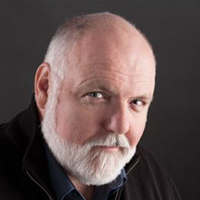Thanks for representing ACTRA members and adding your insight at our recent casting panel. You’ve had many years of on set experiences. Can you tell us how you prepare for auditions and for being on set?
Acting is my job, not my hobby. Auditioning is a significant part of that job. An audition is also an opportunity to perform in front of an audience that is interested and invested! I approach auditions as seriously as any working day on set, and there’s no difference in the kind of preparation I do. My rule of thumb is “If I’m not ready to shoot, I’m not ready to audition.”
I do what it takes to clear enough time to prepare, because there’s work to be done. I usually need 8 to 10 hours to prepare an audition, often more, depending on the size of the role. Sometimes that means cancelling family plans or social engagements and often giving up show tickets. Auditions don’t happen often in Winnipeg, so when they do, I make them a priority.
Of course, preparation means a lot more than just memorizing lines. There’s a performance to prepare for and I don’t have 3 weeks to rehearse. I need to be efficient, without taking shortcuts. I do all the work that needs to be done: I break down the scene, I do research, I do character work, I learn an accent, if needed. I explore the scene in as many ways as possible. Then, I leave all that homework at home and do what I can to be relaxed and confident in the room. I show up on time (which means early) and I do my best to present a performance that is Active, Truthful and Connected.
What has been your favourite or most memorable role thus far?
I’ve been very fortunate to be cast in a lot of fun and interesting roles, and it’s hard to pick a favourite. But I have a particular affection for my recurring role as Rupert Mowat in the CBC series “Nothing Too Good For A Cowboy.” It was the first time I got to develop a character over a series arc and it was a wonderful, creative experience. A team of great writers gave me an unforgettable gift when they created this strange, funny, interesting character and let me collaborate on his development over several years. Truly a highlight.
When did you become an ACTRA member, and what was your first union gig?
It was so long ago, I had to look this up on the ACTRA website and the titles aren’t listed. I joined ACTRA in 1986 or 87 and my first gig was probably doing a radio play for CBC or acting in a corporate training video. My first feature film gig was as a truck driver in Francis Damberger’s movie “Solitaire,” but the scene was cut out. However, I did get to work with Francis many times after that, most recently on the TV comedy series “Tiny Plastic Men.”
How has being a member of ACTRA benefited you?
I joined ACTRA as soon as I could and am so glad I did. Being a member of ACTRA has allowed me to make a half-decent living as a professional actor in Canada. ACTRA ensures that I’m valued as a professional and treated well on-set. ACTRA ensures I’m provided with fair wages, decent working conditions, and receive recognition for my work.
Thanks to ACTRA, I also have an insurance plan, and I even have a sizeable RRSP. ACTRA Performers’ Rights Society has ensured that I continue to receive about 10-15% of my annual income through residuals, royalties and use payments. It also makes me proud to know I’m a member of a national (and international) community of professional actors.
How do you stay sharp? Do you have any training suggestions?
An actor always needs to be learning about their craft, themselves and the world. I believe the best training for an actor is acting. Every job I do is an opportunity to learn.
I jump at any chance to perform, including auditions for film, TV and theatre. I try to get on stage and do a play every year, or so. I also do a little improv, attend workshops, and volunteer for short film projects. I’m also learning as much as I can about filmmaking.
Of course, I think acting classes are important. At this stage of my career, I find teaching and coaching other actors to be a great way to develop my craft and grow as an actor and director. Acting is a collaboration which I love and enjoy sharing. Every actor has different strengths and needs, so make sure yours are being met. I suggest you look for instructors who have actual professional experience working on set and/or on stage. (Yes, I mean me, but I’m not the only one.)
Training shouldn’t be limited to just acting classes, by the way. In the last few years, I’ve taken singing lessons, tap dance classes, unicycle and juggling lessons, and I’m currently taking a beginner class in conversational French. I also write and produce short films. I’ve recently challenged myself by making a series of whimsical short films entirely on my own, to develop my filmmaking skills. I call them SoLowe shorts.
Do you have any advice for other actors out there?
If you want acting to be your profession, take it seriously and approach it as a job. Find as many opportunities as you can to perform and to grow. The more you do, the better you’ll be. Also, remember you’re a human being and so are most of the characters you play. Learn many things, learn about people, and learn about the world. Always be learning, always be growing.
Oh yeah, make sure your health and personal happiness are your first priorities.
Check out my website: www.broccolocreative.com
February 2018

